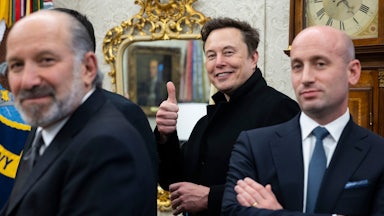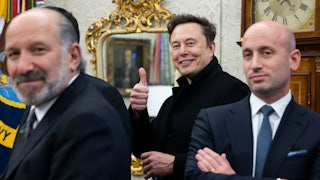On Thursday, The New York Times announced its speaker lineup for a day-long “Climate Forward” event the paper is hosting as part of Climate Week, an annual sprint of panels, happy hours, and other events planned to coincide with the U.N. General Assembly in New York. “Nope, your eyes aren’t deceiving you,” tweeted climate scientist Michael E. Mann with a screenshot of the lineup: One of the speakers listed was Heritage Foundation head and Project 2025 coordinator Kevin Roberts. Project 2025 is a proposed policy bible for a second Trump administration. It’s drawn attention and criticism in recent months for its plans to deconstruct the administrative state bit by bit and abolish the Department of Education, among other right-wing hobby horses. Roberts is a particularly odd person to invite to speak at a climate event: In his foreword to Project 2025, he calls environmentalism “a pseudo-religion meant to baptize liberals’ ruthless pursuit of absolute power in the holy water of environmental virtue.”
In a response to an email asking about the reasoning behind including Roberts, a spokesperson from the Times wrote that Climate Forward “is a live journalism event that has a history of bringing together newsmakers who seek to influence climate and political policy for a day of rigorous, challenging interviews. We anticipate the same for this year’s event.”
There’s nothing wrong, per se, with a newspaper inviting influential right-wingers to join panels. And this wouldn’t be the first time The New York Times invited a fox to comment on the state of the chicken coop: FTX founder Sam Bankman-Fried appeared at a DealBook summit on November 30, 2022, just as the Justice Department and the Securities and Exchange Commission were closing in on his recently imploded crypto empire. But if you’re going to put someone like Roberts onstage at a climate event, you need to at least ask him some challenging questions. The Times didn’t clarify the format in which Roberts will be speaking. While there are details for specific events—including what appears to be a one-on-one interview with Oxy CEO Vicky Hollub on whether an oil company can lower its emissions—there are none yet for one featuring Roberts.
Events like these are hardly the only way news outlets have undermined their credibility on climate topics in recent years. Arguably worse is when outlets invite fossil fuel companies themselves to sponsor daily newsletters. In 2022, Exxon Mobil sponsored more than 100 editions of Washington Post newsletters. Politico and Axios newsletters have also featured fossil fuel sponsors. As Amy Westervelt, Matthew Green, and Joey Grostern reported last year, Reuters, The New York Times, and Bloomberg have all used their in-house ad agencies to make flashy content for the likes of ExxonMobil, BP, and Saudi Aramco. Last month at the Democratic National Convention, Punchbowl News’s Chicago HQ was “presented” by ExxonMobil, featuring a “pop-up conversation” with Texas Representative Lizzie Fletcher and “fireside chat” with Vijay Swarup, the company’s senior director of climate strategy and technology.
Most outlets, of course, have firewalls between their news and business ends to maintain editorial independence. These kinds of commercial ventures, though, can distract from otherwise excellent journalism, create headaches for reporters, and—in the case of bespoke ads or the pop-up with Vijay Swarup—disseminate and legitimize corporate propaganda.
Let’s give the Times the benefit of the doubt and assume the paper does indeed intend to grill Roberts in a rigorous, challenging interview. What should they ask him about? There’s plenty of fodder in Project 2025, like its call for a “whole-of-government unwinding” of the Biden administration’s “climate fanaticism.”
Then there’s Roberts’s forthcoming book, ominously titled Dawn’s Early Light. While initially slated for a September release, it’s been pushed back until a week after the election—potentially to avoid a more public conversation about its context. It might be worth asking Roberts, for instance, about his relationship with Trump and his vice presidential pick, J.D. Vance; Vance wrote the foreword to his book, despite the campaign’s attempt to distance itself from Project 2025.
A good interview would also ask Roberts about the contents of that book, an advance copy of which was distributed to The New Republic. As Colin Dickey notes in his TNR review, Roberts spins out a violent, bloodthirsty fantasy of the need to “fight fire with fire.” He proposes that the National Institute of Allergy and Infectious Diseases, World Economic Forum, FBI, and The New York Times—yes, Roberts mentions them by name—“need to be burned.” (Italics are his.)
Roberts doesn’t write all that much about climate or environmental issues, although he suggests the focus on these topics is part of an overarching plot hatched by “a revolving door of college-educated managers with more class loyalty than company (or country) loyalty; networks of Uniparty institutions, especially Fortune 500 companies, consulting firms, business schools, and data brokers, that coordinate ideas and practices.” The existence of a “Uniparty” is mentioned frequently in the book, albeit never clearly defined. (The head of Heritage, needless to say, is a suboptimal person to be leveling this kind of populist critique: A supermajority of the foundation’s donors have corporations to thank for their fortunes.)
To hear Roberts and his fellow travelers tell it, the “puppet strings” of well-meaning corporations are being manipulated by a shadowy cabal of wokes who are forcing them to enact diversity, equity, and inclusion policies and consider environmental, social, and governance factors in their investment decisions. “The Great Reset,” he writes at one point, referencing a 2020 World Economic Forum Covid-19 economic recovery plan that has been the target of many conspiracy theories, “is socialism wearing the modern corporation as a skinsuit.” Some companies like Google, Goldman Sachs, and Raytheon, according to Roberts, have become “Uniparty bastions,” in need of overthrow. ESG, he writes, is “actually a system for punishing the lawful and empowering the unlawful. Effectively, it’s anarcho-tyranny for business.”
Roberts further suggests a “direct assault on the sources of Uniparty strength” will “help us topple our corrupt elites and replace them with new and earnest ones who actually love America.” He asserts that so-called green transition “mandates” for electric vehicles—the U.S. has no such federal mandates—“ensure a far more controllable population (all modern EVs are basically smartphones on wheels). You can clearly see the future forming: deplatforming drivers for spreading misinformation or failing to follow the latest vaccine mandate; mandatory climate lockdowns to limit carbon emissions.”
Looking through Roberts’s own words on the subject of climate change, it’s hard to imagine the case for putting him onstage to talk about it. However rigorous the interview might be—might being the operative word—giving him the mic feels like a throwback to the days when cable news shows felt the need to “balance” climate scientists with outright kooks who denied the climate was changing. Some of those kooks were on Heritage payrolls too. It was awful then, and it’s awful now.








